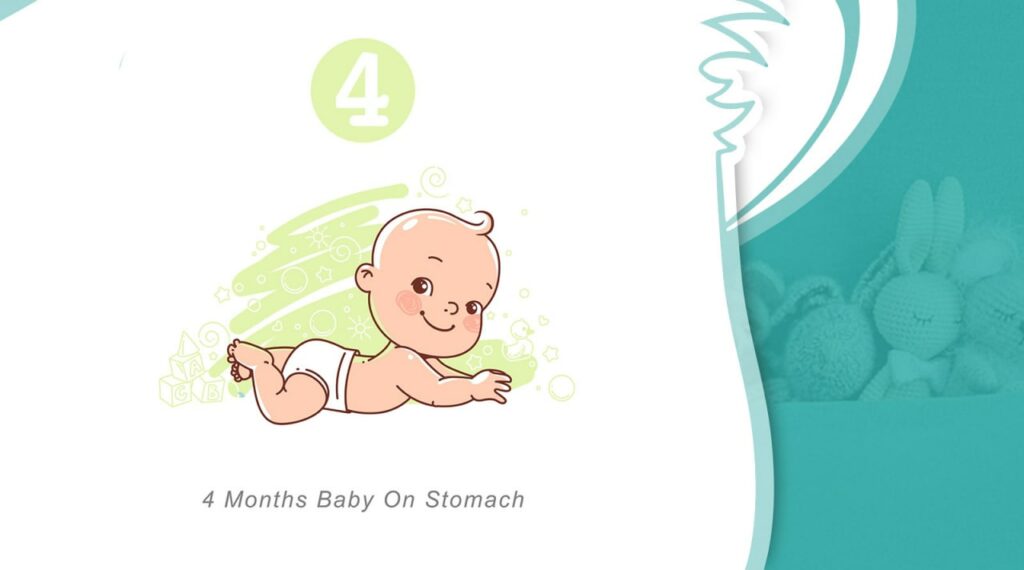Are you up for a four-month-old baby adventure train? Your beautiful baby has outgrown the newborn stage and has just begun his journey of discovery of life and the community around him.
This month, your baby’s height grows, as its length in the fourth month of life ranges between 60-68 cm, depending on gender. The weight also varies according to gender, ranging from 5.1 to 8.2, but it is common knowledge that a baby grows to be twice his birth weight.
This month, you will notice your baby’s social and emotional development. So that the brain develops rapidly, which is reflected in cognitive ability and focus, and your baby is able to recognize parents, express happiness and sadness, and express his mood and desires.
By four months, your baby’s vision has developed to the point where he can follow people with his eyes when they move away from him for long distances, as well as track toys and his favorite things. Furthermore, his neck strength allows him to stabilize his head and not bend forward or backward, to sit upright with pillars around him, and to follow moving objects with his eyes from side to side. He is drawn to shapes and brightly colored toys and tries to reach them.
A four-month-old baby can keep his head straight when seated. In addition, he can lean on his arms during tummy time and tries to roll or flip on his back, which he can do by the end of the fourth month, in addition to attempting to catch things in front of him.
The four-month-old baby enjoys holding things, shaking them, and moving them to his mouth. You may also notice that at this age, he enjoys playing with his feet and reaches for almost anything! This is because he now has vision coordination with movement, which means that if he is drawn to something, he will try to reach it in various ways and may eventually put it in his mouth.
At this stage, your baby will be showering you with sweet smiles; the days of guessing whether he’s having gas or smiling are over. You will also notice that your baby enjoys smiling at familiar faces.
A four-month-old baby enjoys playing with toys, and this is the start of many years of tripping and walking on toys on the ground. It will be worthwhile because your baby is working hard to form new brain connections and master gross and fine motor skills. These toys stimulate your baby’s development so much that when it’s time to stop playing, he’ll be frustrated or cry.
A four-month-old baby begins to develop his own language and attempts to babble and pronounce groups of vowels and consonants like gaga, baba, or mama. Furthermore, your baby may imitate your sounds and even your facial expressions. Talk to him and keep a diary of his development whenever you have the opportunity.

Your four-month-old baby feeding
Your baby still requires breastfeeding, whether it is breastfeeding or formula feeding. At this age, he requires 8 to 10 feedings every 3 to four hours, depending on his hunger and the amount of effort he exerts during playtime. The number of feeds also varies depending on how much he sleeps or if he is sick or feels ill. Furthermore, your baby’s diaper consumption decreases, as he requires four to 6 diapers per day.
Many mothers wonder if they can start feeding their babies this month.
Regardless of the importance of breastfeeding, whether natural or artificial, you can begin feeding your baby one or two meals per day after consulting a specialist pediatrician and when your baby exhibits the following symptoms:
- He can raise and maintain his head.
- When he sees food or drink, he opens his mouth.
- He sucks his fingers out of hunger, or the number of feedings increases.
Doctors typically recommend beginning with well-mashed or finely ground food, such as well-mashed vegetable soup or well-mashed boiled potatoes. And don’t forget to keep an eye on your baby after you start feeding him in case he develops allergy symptoms or his digestive system is not accepting food.
It is also important to note whether your baby accepts food or not, as some babies do not accept food, so you do not have to force him and wait until he is 6 months old in this case. It is important to note that the baby’s food in the fourth month is liquid rather than solid to avoid digestive and excretory problems.
Warning: avoid giving your four-month-old baby honey. Honey should never be given to babies under the age of 12 months. This is due to the risk of contracting a rare and dangerous food poisoning that causes nerve dysfunction, resulting in weakness and paralysis.
Your four-month-old baby sleeping
The four-month-old baby sleeping habits have improved. When he sleeps in a quiet and satiated environment and his diaper is clean and deeply absorbent, he will sleep for 7 continuous hours at night, whereas during the day he will need multiple naps to reach 12 to 1four hours of sleep per day.
The aforementioned only sometimes occurs with all babies. Your baby may wake up crying in the middle of the night for no apparent reason. To get him to sleep again, all you have to do is hold him, calm him down, and breastfeed him.
Allowing your baby to sleep with or near small toys must be avoided so that nothing falls into his mouth and causes suffocation.
How do you promote your four-month-old baby’s growth?
- Because your baby is discovering the world around him at this age and is holding toys and small objects before putting them in his mouth, you must always keep his hands clean by washing them with soap and water. It should be noted that if the influenza virus is present on hard surfaces, it can remain active for a day or more. Also, keep your hands clean at all times, especially after changing a diaper.
- Keep your phone away from your four-month-old baby and don’t let him play with it, because no matter how clean the screen is, bacteria will still be present. Experts discovered bacteria in approximately 92% of the phones examined in a previous study conducted by the British Research Institute. Furthermore, the most common bacteria is Escherichia coli, which is more dangerous to babies’ stomachs and causes serious complications.
- Some mothers at this age use a clever trick in which a mirror is hung on a wall or placed in a game area so that the baby in the fourth month can identify the features of his face and body parts. So the mother tickles him, says his name, and addresses him in front of the mirror to help him identify himself and understand what is going on around him.
- Talk and sing to your baby to develop a language of communication between you. Also, if he babbles, it is sufficient to repeat what he said to encourage him to speak.
- Do not neglect to take your four-month-old baby to a specialist pediatrician for the necessary vaccinations at this age, such as the polio vaccine and the Hib vaccine.
When can you worry about your four-month-old baby’s health?
If you notice any of the following symptoms, you should visit your pediatrician immediately:
- If his weight has not increased by at least 50% since birth,
- Has no smile, laugh, or babble.
- He cannot rest his head, but you can see that he remains flaccid.
- He can’t just sit with support.
- He is always sleepy and does not fully open his eyes when awake.
- He doesn’t care when he sees your face; that is, he isn’t aware of the details of your face. He isn’t interested in toys or colorful shapes.
- Constantly spitting up and vomiting.
Your four-month-old baby is maturing and becoming more aware of his surroundings. While you may feel like you’ve put in a lot of effort and are tired and exhausted, it’s okay; most moms feel the same way you do, and we were all kids once. The baby in the fourth month requires more and more love and attention, and it is also growing quickly, so don’t neglect to take beautiful photos of your baby with yourself, your family, and your friends.


